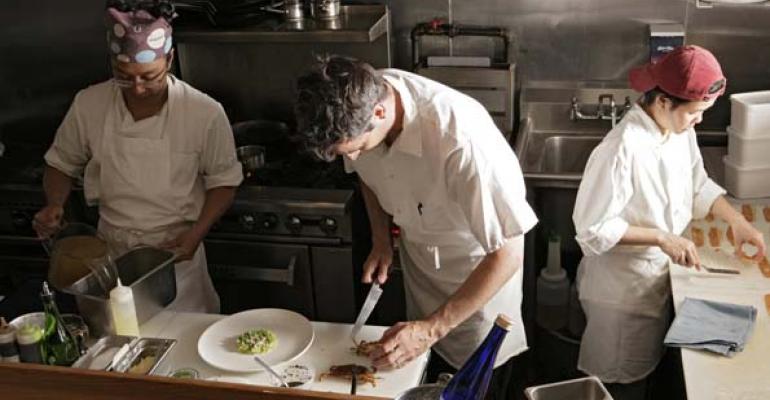To manage rising development costs, a growing number of foodservice operators are exploring smaller, more efficient kitchen footprints that cost less to build and run than larger, freestanding units.
Sized to fit in strip malls, kiosks, college dining halls and other nontraditional locations, these smaller units typically rely on prepared, packaged foods that are rethermalized at the time of service. Such a setup is much more compact and cost-efficient than the conventional back-of-the-house, designed-for-scratch cooking, with its bulky six-burner ranges, ovens and walk-in refrigerator and freezer.
“The cost of real estate and food and labor are leading a lot of operators to look at alternatives such as heat-and-serve foodservice,” says Lucian Gray, director, North America Foodservice Business Development for Sealed Air Corp.’s Food Care Division, of which Cryovac® brand food packaging is a part. “We’re seeing that not just in fast-casual and quick-service restaurants, but even in K-12 schools, the military and universities — virtually every segment we talk to.”
For example, aseptic or retort pouches of prepared soups, stews, sauces and entrees can be quickly rethermalized at service, saving substantial time and labor, compared to cooking from scratch.
“Labor and food costs easily equal almost 70 percent of the total cost of running a restaurant,” says Gray. “If you can tweak those by 1 percent on labor and 1 percent on food cost by being more efficient, it is a straight fall to the bottom line.”
Thus, an operator might choose to purchase prepared taco meat in flexible pouches rather than cook it from scratch in the units. “Rethermalizing pouches in a water bath takes up far less space and uses much less energy than a conventional range,” says Gray. “You also don’t need a hooded vent in the kitchen that draws in makeup air that must be heated or cooled.”
“As operators migrate away from ranges and ovens to rethermalizers and cold-cavity cooking with microwaves, they have a lot less capital outlay and much higher return on investment while maintaining menu integrity,” Gray adds.
Operators with a small kitchen footprint also can benefit from using the Cryovac® Oven Ease® ovenable bag, designed for pre-seasoned or pre-marinated products such as ribs, roasts, whole turkeys and hams. Such items can be cooked inside the same material it is packaged in, saving the prep time and clean-up time associated with preparing and cleaning up potentially complex meals, such as roasts, by hand in the kitchen. Once cooked, these items can be easily reheated without removing them from the package.
“As Henry Ford said, every time you touch a product you add to its cost,” says Gray. “So the fewer touches there are in the kitchen, the more savings go to the bottom line.”
Cryovac® Flavour Mark™ flexible pouches may be the solution for those who require shelf-stable flexible packaging. Flavour Mark™ retort pouches are designed for products such as chili with meat, soups, stews, vegetables, olives, mushrooms and sauces. Flavour Mark™ aseptic packages are for condiments, stocks, broths, liquid dairy products and sauces. Both are perfect for operations with limited refrigerator/freezer capacity.
Packaging solutions like those can increase the odds of success for limited-time offerings. Because an LTO item in a pouch is so easy to store, reheat and serve, it can be rolled out without as much staff training as a more complicated, scratch-cooked item, helping it get off to a fast start.
Speed is critical in the hyper-competitive new products arena. “You want to be the first one out with the new product, not the me-too guy,” says Gray. “No one has the luxury of waiting extra months to tweak a product.”
Sealed Air is ready to share its packaging expertise with operators who are exploring more efficient and profitable restaurant design and operations.
“Our packaging solutions can help operators make sound decisions at the outset, which will bring them immediate and long-lasting returns,” says Gray. “We want to be there at the beginning to help them plan.”
For more information, visit cryovac.com or call 800-391-5645.





